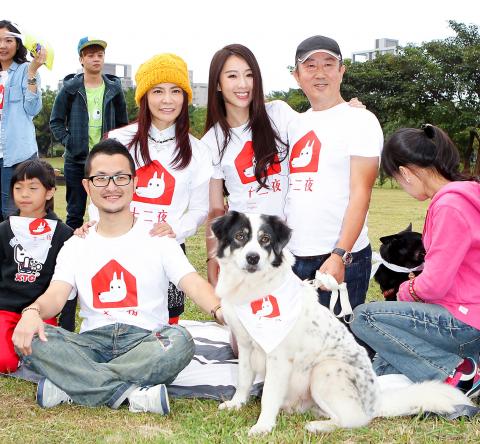The documentary Twelve Days (十 二夜), which depicts the lives of dogs in a public animal shelter — in which dogs are put to death after 12 days if they are not adopted — held its premier in Taipei yesterday, calling on people to think carefully before adopting pets, rather than adopting and then abandoning them.
With no spoken dialogue, the film uses camera angles to show the lives of dogs in the animal shelter from the dogs’ viewpoints, from when they are brought to the shelter until they are taken to be put to death, as well as rarely seen moments from early in the morning before the staff arrive and late at night, after the workers have all gone home.
“Many people have the mistaken idea that sending stray animals that they find on the streets directly to animal shelters is the best thing to do for them, but actually they will have only 12 days to live if no one adopts them,” film director Raye (who goes by a single English name) said.

Photo: Wang Wen-lin, Taipei Times
“More than 70,000 animals, mostly dogs, are put to death at public shelters in Taiwan every year, at an average of about 200 dogs per day,” she said, expressing hopes that the movie can motivate more people to help share the responsibility for taking good care of animals and to reduce the numbers of animals put to death.
A woman who adopted one of the dogs, which features prominently in the documentary — an elderly beagle — said: “Actually, I find it easier to adopt an elderly dog from the animal shelter, because they may have been pets to other people in the past, so the dog I adopted was quite stable and did not behave wildly like puppies do.”
The film’s executive producer, Giddens Ko (柯景騰), better known by his pseudonym Jiubadao (九把刀), said they have decided to donate all the box office earnings, excluding the fee for theaters and tax, to animal welfare groups to help stray animals.
The documentary is to be shown in theaters from Friday.

Chinese spouse and influencer Guan Guan’s (關關) residency permit has been revoked for repeatedly posting pro-China videos that threaten national security, the National Immigration Agency confirmed today. Guan Guan has said many controversial statements in her videos posted to Douyin (抖音), including “the red flag will soon be painted all over Taiwan” and “Taiwan is an inseparable part of China,” and expressing hope for expedited reunification. The agency last year received multiple reports alleging that Guan Guan had advocated for armed reunification. After verifying the reports, the agency last month issued a notice requiring her to appear and explain her actions. Guan

GIVE AND TAKE: Blood demand continues to rise each year, while fewer young donors are available due to the nation’s falling birthrate, a doctor said Blood donors can redeem points earned from donations to obtain limited edition Formosan black bear travel mugs, the Kaohsiung Blood Center said yesterday, as it announced a goal of stocking 20,000 units of blood prior to the Lunar New Year. The last month of the lunar year is National Blood Donation Month, when local centers seek to stockpile blood for use during the Lunar New Year holiday. The blood demand in southern Taiwan — including Tainan and Kaohsiung, as well as Chiayi, Pingtung, Penghu and Taitung counties — is about 2,000 units per day, the center said. The donation campaign aims to boost

The Kaohsiung Tourism Bureau audited six hotels in an effort to prevent price gouging ahead of Korean band BTS’ concert tour in the city scheduled for Nov. 19, 21 and 22 this year. The bureau on Friday said that the audits — conducted in response to allegations of unfair pricing posted on social media — found no wrongdoing. These establishments included the local branches of Chateau de Chine, Hotel Nikko, My Humble House, and Grand Hai Lai, it said, adding that the Consumer Protection Commission would have penalized price gougers had the accusations been substantiated. The bureau said the Tourism Development Act

The Central Weather Administration (CWA) said a magnitude 4.9 earthquake that struck off the coast of eastern Taiwan yesterday was an independent event and part of a stress-adjustment process. The earthquake occurred at 4:47pm, with its epicenter at sea about 45.4km south of Yilan County Hall at a depth of 5.9km, the CWA said. The quake's intensity, which gauges the actual effects of a temblor, was highest in several townships in Yilan and neighboring Hualien County, where it measured 4 on Taiwan's seven-tier intensity scale, the CWA said. Lin Po-yu (林柏佑), a division chief at the CWA's Seismological Center, told a news conference